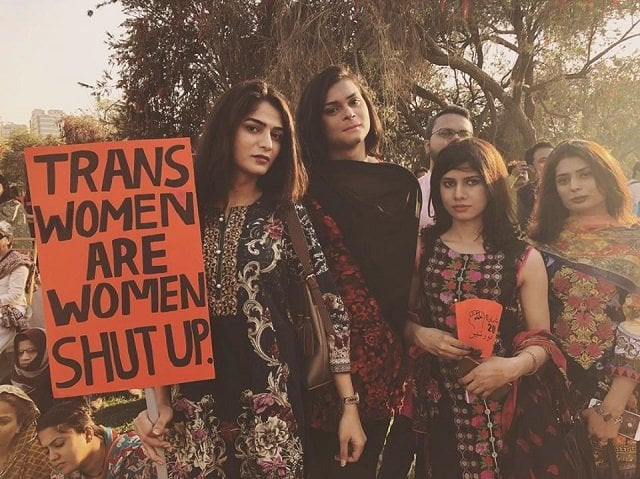If not you then who, if not now then when?
Aurat March has an unorthodox and bold twist that has unleashed an exciting era in the women’s movement

PHOTO COURTESY: AURAT FOUNDATION
Woh tum ko khouf delain ge
Jo hai woh bhi khosakhta hai
Is rah mein rahzen hain itney
Kuch aur yahan ho sakta hai
Kuch aur tou aksar hota hai
Par tum jis lamhey mein zinda ho
Yeh lamha tum say zinda hay
Yeh waqt nahin phir aega
Tum apni karni kar guzro
Jo ho ga dekha jai ga”
Fehmida Riaz (Faiz Kehte)
The Aurat March is the new women’s movement. At its core is the fight against patriarchy and it carries forward the rich legacy of the women’s movement in Pakistan. All those who believe in demanding change to the discriminatory economic and social order that oppresses women, and for that matter other vulnerable people, belong at the Aurat March. There is no better time and no greater opportunity than this to come together.
In fact, the Sub-continent has a rich history of women organising to resist and demand change against injustice and violence. In the past, the women’s movement in Pakistan has been instrumental in questioning the status quo and resisting political social oppression. Women were an active part of the democracy movement during all dictatorships and were instrumental in riding us out of most of the archaic Hudood Ordinances — discriminatory laws that targeted women and minorities. In India, in the province of Maharashtra, women activists formed an anti-price rise women’s committee and organised direct action against the hoarding of essential goods. The Chipko movement was where women hugged trees against their arbitrary felling. The hugging symbolised a protest against deforestation and the scarcity of essentials. In Bangladesh, when General Ershad took power and attempted to Islamise the country, the Naripokhkho movement brought to light a feminist political perspective. Another is the Karmojibi Nari group that focuses on the rights of women workers.
Led and organised by young women, the Aurat March is a new promise and hope for the women and girls of this country. Honour killings, early and forced marriages, rampant economic and domestic violence, and sexual violence are some of the obvious forms of violence that the Aurat March seeks to demand an end to. The march also demands environmental, economic, political, bodily and legal rights.
In addition to all this, Pakistan’s Aurat March has an unorthodox and bold twist that has unleashed an exciting era in the women’s movement. This is to question not just political disenfranchisement, violence and economic disempowerment but also other pertinent issues of which two particularly stand out because they break away from traditional demands, the wit used to communicate them and the attention — both good and negative — they have gained. Firstly, it is questioning cultural taboos and nuances that have never been questioned this way and by such a loud unified voice. A few examples from last year include: why is there an expectation that a woman will heat up the man’s food, find his clothes, or sit, walk, and behave in a certain way? These concerns have outraged the overbearing masculinity that surrounds us and takes benefit of the ‘service’ provided to them. Second is the courageous and collective demand by women to control their own bodies. This has perhaps been the greatest shock to the misogynistic status quo. These conservative quarters can feel the control they have enjoyed for so long, being taken away from them. The numbers at the marches and the cities they are held in grow every year, revealing one obvious thing — that the issues being addressed have hit a core nerve with women across the country.
Even before March 8, the Aurat March has successfully created a growing consciousness around issues that once looked to be radical ideas and are now being viewed as fundamental rights such as dignity, equality, and choice.
So I humbly urge: march for yourself and for those silenced by patriarchy and poverty. But more importantly march for the future. After all, if not you then who, if not now then when?
Published in The Express Tribune, March 7th, 2020.
Like Opinion & Editorial on Facebook, follow @ETOpEd on Twitter to receive all updates on all our daily pieces.















COMMENTS
Comments are moderated and generally will be posted if they are on-topic and not abusive.
For more information, please see our Comments FAQ